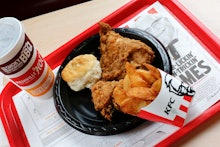Soda can no longer be the default drink on kids’ menus in California

Children with obesity tend to be bullied more than their peers — and they’re more likely to have obesity as an adult, according to the Centers for Disease Control and Prevention. Nearly 1 in every 5 kids ages 6 to 19 in the United States has obesity, which is also linked with a higher risk for diabetes, asthma and heart disease.
The facts are pretty grim, but California is helping its kids avoid these risks. A healthy kids’ meal bill that goes into effect at the start of 2019 will prevent soda or other sugary drinks from being the default on all restaurants’ kids’ meal menus. Chains like Chick-fil-A and Popeyes currently serve their kids’ meals with a small drink — which is often filled with fountain soda — and the hope is that more healthful beverages, like water and milk, will take their place. There is strong evidence that links sugary beverage consumption with obesity; this bill is a simple play to thwart habits that lead to obesity in childhood and later in life.
Why changing the default matters
It’s a simple-sounding swap, but the mandate has potential to yield great change. “There’s lots of evidence in a wide range of fields that show people stick with the default,” Margo Wootan, the Center for Science in the Public Interest’s vice president for nutrition, said in a phone interview. “We make a lot of decisions on autopilot. You’re busy, you’re thinking about other things, and defaults have a lot of influence.” Wootan added that parents, in particular, are often likely to choose the default option because mealtime ordering can be hectic and parents often have more pressing priorities.
The fact that soda can still be ordered by request is key here, since it gives consumers freedom to choose. The new bill provides an easy way to help parents make healthier choices for their kids, which is something polls show that an increasing number of parents want, Wootan said. “It’s not interfering with people’s ability to get what they want, it’s trying to support parents in what they want to do for their kids — which, for most parents, is to feed them more healthfully,” Wootan said.
How kids’ meals lead to lifelong habits
The future implications of the bill are perhaps even more impactful. The drink default could change the eating behaviors of younger generations. Eating habits are learned, or as Wootan put it, “Kids are not born with an innate desire for burgers and fries.” If kids are raised not to expect a soda or sugary drink with their restaurant meal, they’re less likely to make the soda order when they’re adults.
“Kids are not born with an innate desire for burgers and fries.” — Margo Wootan
The country eats out more than it ever has in the past, and kids get about a quarter of their calories from restaurants. “Kids’ meals [and menus] are a powerful form of marketing,” Wootan said, because they set a standard for what kids “should” be eating. Children’s meals don’t have to come with a soda, nor do they have to be nutritionally void. “It’s from the billions of dollars in marketing that kids are exposed to year after year that cultivate the norm we have in the U.S. that kids food is unhealthy,” Wootan said.
Moving in a healthier direction
The bill is just a first step in cleaning up children’s food, and will hopefully lead to greater change down the line. Many major restaurant groups have already made the switch from soda to healthier options: McDonald’s nixed soda from its Happy Meal default back in 2013, and restaurants including Wendy’s, Burger King, Dairy Queen, Applebee’s and Jack in the Box soon followed suit. Still, according to CSPI’s research, 74% of the top 50 restaurant chains with kids’ menus continue to offer sugary drinks on those menus. These chains will have to alter their kids’ menus in California.
While California is the first state to pass the legislation, other cities around the nation have embraced the concept, including Baltimore and Lafayette, Colorado. New York City and the states of Hawaii and Vermont are expected to pass similar bills, according to CSPI.
Soda drinking is not the only habit linked to obesity, but it’s low-hanging fruit to incite legislation like California’s, since the public has generally accepted soda as unhealthy. In 2016, bottled water surpassed soft drinks as the top-selling beverage in the United States: It was the first time soda did not place in that top spot. Americans are increasingly showing a desire to get healthier, and the laws are slowly adapting along with them.